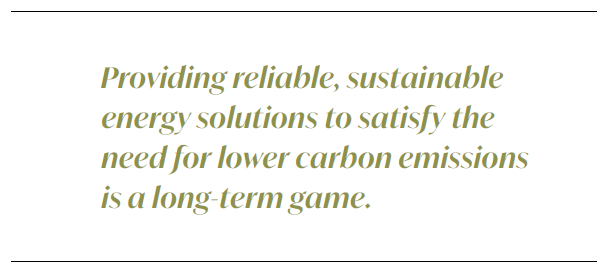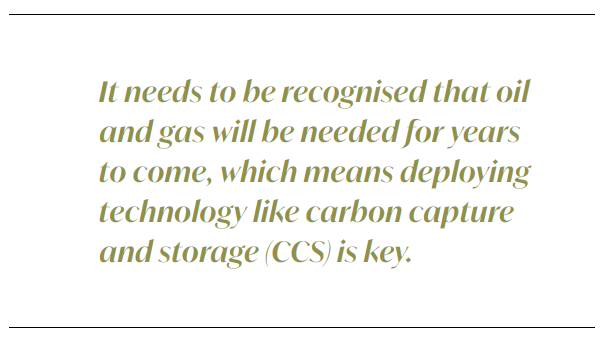The speed of the energy transition [Gas in Transition]
“Science is clear about climate change and energy transition, our task is delivery,” Lord Browne said. COP26 resulted in commitments that aim to limit global warming, but despite progress to date, there is much that still needs to be done to put energy transition on track.
First, the world needs to put energy transition in context. Over 80% of global energy is produced from fossil fuels and credible forecasts show that even by 2050, based on current stated policies, it will still be around 70%. Despite the rapid progress of renewables, natural gas will continue to be in significant demand even by 2050. This means that energy will continue to be dependent on hydrocarbons for many years to come and that oil and gas companies will have to be part of the global effort to make energy transition a reality. The world also needs to be realistic about the pace of climate change.
Second, we need to take action not only on supply, but also on demand for fossil fuels. For example, the steel industry can accelerate fuel transition to hydrogen for the bulk of its steel production. Even with higher costs, for a car the additional cost will be of the order of 1%. Agriculture is another example. It contributes about 20% to global emissions, but there is a long way to go to deliver sustainable farming with net zero emissions.
Third, the world needs to achieve better and more widespread use of energy efficiency. Digitalisation and machine learning can help make the decisions to automate the process. Technology can dramatically reduce shipping emissions. If shipping were a country, it would be the sixth bigger emitter globally.
Fourth, we must actually deliver the transition. In addition to pledging net zero, countries and companies must implement policies to actually reduce emissions. Consumers have considerable power to demand change by giving preference to buying net zero carbon products. Business leaders can commit to ESG and science-based climate change targets. Fossil-fuel companies should embrace the work of the Science-Based Target initiative to set emission-reduction targets in line with climate science.
Investors must avoid making simplistic decisions and taking actions such as divestment from oil and gas majors that in reality make little change. What the majors divest is taken by others, often less committed to climate change, and continue being operated. And it is true that so far asset divestments by majors have not led to any reductions in oil and gas reserves.
The objective must be to reduce emissions, not to divest for the sake of divestment. The onus for ensuring reduction of emissions should be left with governments. Company CEOs should be expected to demonstrate compliance with net zero pledges they make through annual reporting. We need to think through what we do and what actions we take. Transitions take time – we cannot change things overnight.
Earlier, Lord Browne said “energy demand is growing rapidly globally. There is no sign that this trend will discontinue. Therefore, providing reliable, sustainable energy solutions to satisfy the need for lower carbon emissions is a long-term game.”
 CEOs should take note that the history of oil and gas companies has not been very good. That also includes governments. There was a touch of arrogance in not considering the impact of their activities on climate change. But the generational change of CEOs is now overcoming this. And it is timely, because they risk their social license to operate being taken away if there is no serious and visible change. Their proactive cooperation could be game-changing.
CEOs should take note that the history of oil and gas companies has not been very good. That also includes governments. There was a touch of arrogance in not considering the impact of their activities on climate change. But the generational change of CEOs is now overcoming this. And it is timely, because they risk their social license to operate being taken away if there is no serious and visible change. Their proactive cooperation could be game-changing.
Depending on geography and politics, future energy needs will require a mix of different energy sources. Hydrogen will be a key part of this. In an earlier interview, he said that “it needs to be recognised that oil and gas will be needed for years to come, which means deploying technology like carbon capture and storage (CCS) is key.” He believes that “oil and gas producers are well placed to adopt and deploy these technologies across their global operations, and it is time for them to do so because investors, consumers and regulators are demanding it.”
In the discussion that followed, Lord Browne emphasized that diversity is essential to get robust solutions to problems. In the energy transition, we need to examine what different people want. We must commit to inclusion and teamworking. The needs of people are changing everywhere. They are asking for something better that does not harm the environment.
But energy costs matter, especially the cost of electricity that has direct impact on consumers. He expressed hope that the energy crisis and high gas and electricity costs will not delay energy transition.
His parting message was that the world needs to be realistic – transitions take time.



